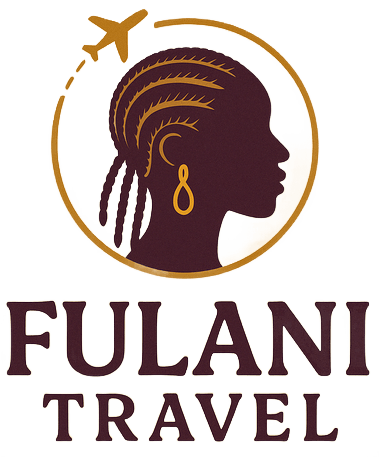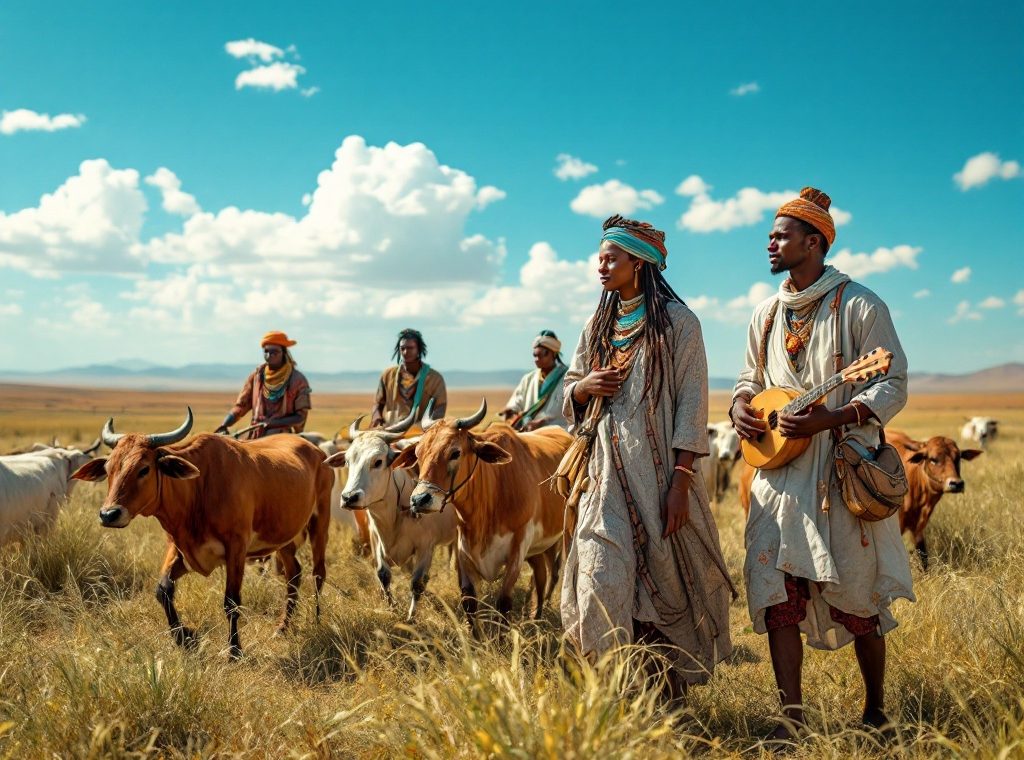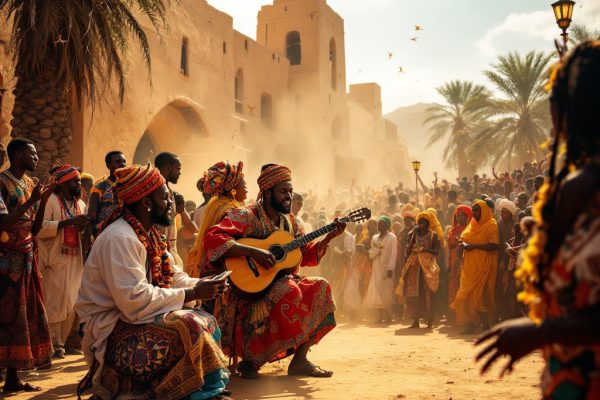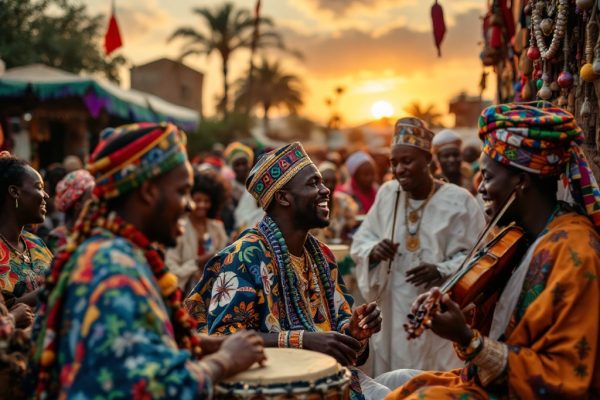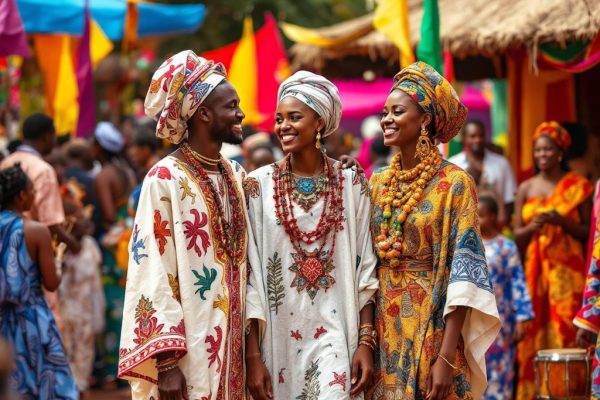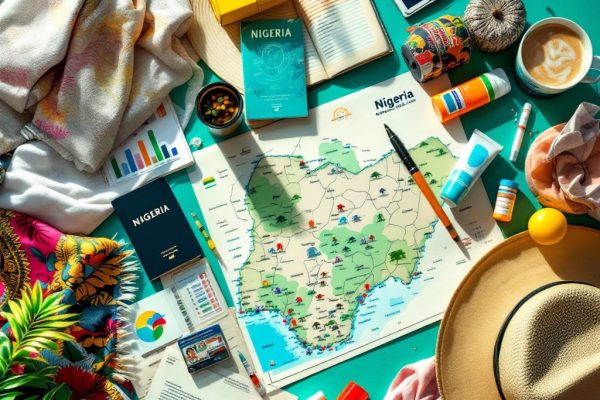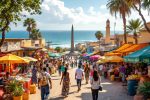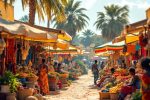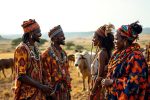Who Are the Fulbe People?
Discover the fascinating Fulbe people, the world’s largest nomadic pastoral community! Spread across West Africa, from the Sahara to the Sahel, the Fulbe have a rich history, founding kingdoms like Tekruur and Futa Jalon. Learn about their unique culture, including the Pulaaku code, their societal structure, and the Fulfulde language. Explore their significant contribution to the spread of Islam and their impact on West African history. Delve into the captivating world of the Fulbe and broaden your understanding of this remarkable culture.
Important information
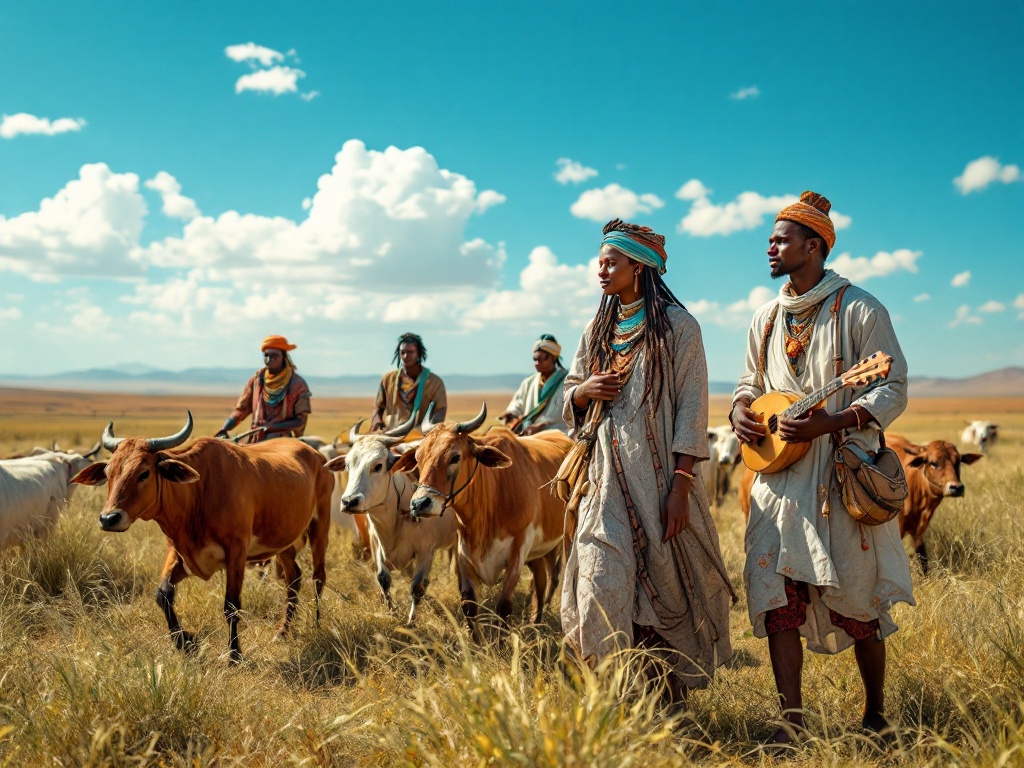
- The Fulbe (also known as Fulani) are the world’s largest nomadic pastoralist group, primarily located across the Sahara, Sahel, and West Africa.
- They significantly contributed to the spread of Islam in West Africa, founding kingdoms like Tekruur, Futa Jalon, and Futa Toro, and leading impactful jihads.
- Fulfulde, with variations like Pulaar, is their language, belonging to the Niger-Congo family. These dialects reflect their wide distribution.
- Their society traditionally follows a caste system and a cultural code called Pulaaku, which values courage, hospitality, and self-respect.
- Though primarily cattle herders, they also raise sheep and goats, a lifestyle adapted to the Sahara and Sahel regions.
Who Are the Fulbe People?
The Fulbe, also called Fulani, are a prominent African ethnic group dispersed across the Sahara, Sahel, and West Africa. They are renowned for their nomadic pastoralism and constitute the world’s largest such community. With a rich history of migration throughout West Africa, the Fulbe founded powerful kingdoms such as Tekruur, Futa Jalon, and Futa Toro, significantly contributing to the spread of Islam. Their structured society incorporates a caste system and adheres to a cultural code known as Pulaaku. While primarily speaking Fulfulde, variations such as Pulaar exist within the Niger-Congo language family. Large Fulbe populations thrive in numerous countries, including Nigeria, Mali, Senegal, Mauritania, Guinea, Cameroon, and Niger.
Names and Ethnonyms
The Fulani, predominantly Muslim pastoralists, are known by various names across West Africa. They identify as Fulɓe (Pullo in the singular). Variations like Fulbe, Fula, and Peul also exist. In English, however, “Fulani,” derived from the Hausa language, is most common.
Understanding the Term ‘Fulani’
The term “Fulani” is an externally applied label. The people themselves use Fulɓe (or Pullo for an individual). Other names, such as Fula and Peul, are also regionally prevalent.
Alternative Names: Fulbe, Fula, Peul
The Fulani people predominantly refer to themselves as Fulbe. English and French speakers typically use Fula. In Senegal and other French-speaking regions, the term Peul is common.
Geographic Distribution
The
Spread Across the Sahara and Sahel
The Fulani people, traditionally nomadic pastoralists, range across the Sahara and Sahel regions. Their itinerant lifestyle has profoundly shaped their presence, herding livestock across these vast landscapes.
Key Countries of Residence: Mali, Senegal, Mauritania, Nigeria
The Check-MIG is a mandatory form for all travelers entering or leaving Colombia. This includes Colombian citizens and residents, regardless of visa type or country of origin. You must complete the Check-MIG form between 24 and 72 hours before your flight. This timeframe allows sufficient time to address any potential technical issues. The information required on the Check-MIG form includes personal details such as full name, passport number, nationality, and date of birth, as well as travel and health information. You should receive an email confirmation of your Check-MIG registration within 24 hours. However, it is recommended to submit the form earlier to avoid any delays. The Check-MIG form is valid for a single entry or exit. If you plan multiple trips to and from Colombia, you will need to complete a new form for each trip.
Step 1: Key Information About Check-MIG. All travelers to or from Colombia are required to complete the Check-MIG form. This includes Colombian citizens and residents, regardless of visa type or country of origin.
Step 2: Timely Form Submission. The Check-MIG form must be submitted between 24 and 72 hours before your scheduled flight. This ensures ample time to resolve any technical difficulties.
Step 3: Required Information. Provide accurate personal information on the Check-MIG form, including your full name, passport number, nationality, date of birth, travel details, and health information.
Step 4: Standard Processing Time. You should receive an email confirming your Check-MIG registration within 24 hours. However, submitting the form in advance is recommended to avoid potential delays.
Step 5: Form Validity. The Check-MIG form is valid for a single entry or exit only. For multiple trips to and from Colombia, you must complete a new form for each trip.
Historical Context
Migrating south from North Africa, the Fulani established powerful kingdoms like Tekruur, Futa Jalon, and Futa Toro, leaving a lasting mark on West African history and culture. They also played a crucial role in disseminating Islam throughout the region.
Demographic and Migration History
Originating in North Africa, the Fulani migrated south, impacting their settlement across the Sahel and Sahara. This widespread dispersion fostered cultural exchange as they integrated with diverse West African communities, ultimately enriching the region.
Early Kingdoms: Tekruur, Futa Jalon, Futa Toro
The Fulani people have left an enduring legacy in West Africa, marked by the establishment of powerful kingdoms such as Tekruur, Futa Jalon, and Futa Toro. Tekruur, situated in present-day Senegal and Mauritania, emerged around the 9th century, representing an early hub of Fulani power. In the 17th century, the kingdom of Futa Jalon arose in modern Guinea. Futa Toro, also located in contemporary Senegal, followed in 1776. These kingdoms underscore the Fulani people’s significant and lasting impact on the history of West Africa.
Tekruur, located in modern-day Senegal and Mauritania, emerged around the 9th century. It was an early center of Fulani power.
In the 17th century, the kingdom of Futa Jalon arose in present-day Guinea.
Futa Toro, also situated in modern Senegal, was established in 1776.
Impact of the Fula Jihads
The Fula jihads, spanning the 17th to 19th centuries, dramatically reshaped West Africa. Driven by religious reform and political unity, these wars led to the rise of new Islamic states, such as the Sokoto Caliphate in modern-day Nigeria. The jihads significantly expanded Fulani influence, integrating various groups into these burgeoning states. However, the jihads’ complexity fostered intricate relationships with existing powers, resulting in a mix of strategic alliances and fierce battles.
Language and Communication
Fulfulde, the language of the Fulani people, belongs to the Niger-Congo family’s Atlantic branch. Its numerous dialects, like Pulaar, vary significantly, reflecting the Fulani’s vast geographic distribution.
The Fula Language and Its Dialects
Fulfulde, the language of the Fulani people, has many dialects across West Africa, each showing unique regional and cultural influences. For example, Pulaar is common in Senegal and Mauritania. This variety shows how widely spread the Fulani people are.
Fulfulde and Pulaar: Regional Variations
Fulfulde (eastern) and Pulaar (western) are dialects of the Fula language, differing in pronunciation, vocabulary, and grammar. This variation reflects the vast geographic distribution of Fulani communities. For example, the word for “cow” differs between Nigeria and Senegal. A Nigerian Fulfulde speaker might use one term, while a Senegalese Pulaar speaker would use another. Despite these differences, speakers generally understand each other, demonstrating a core shared linguistic foundation. The internal variations within both Fulfulde and Pulaar further showcase the rich diversity of the Fula language.
Religious Beliefs
The Check-MIG is a mandatory form for everyone traveling to or from Colombia. This includes Colombian citizens and residents, regardless of visa type or country of origin. You must complete the Check-MIG form between 24 and 72 hours before your flight. This timeframe allows ample time to address any potential technical difficulties. When completing the form, provide personal information such as your full name, passport number, nationality, and date of birth, along with travel details and health information. You should receive a confirmation email within 24 hours of registration. However, it’s best to submit the form earlier to avoid any delays. The Check-MIG form is valid for a single entry or exit. If you’re planning multiple trips to and from Colombia, you will need to complete a new form for each journey.
Step 1: Key Information About Check-MIG. Every traveler to or from Colombia must complete the Check-MIG form. This applies to Colombian citizens and residents too, regardless of visa type or country of origin.
Step 2: Timely Form Submission. Submit the Check-MIG form between 24 and 72 hours before your flight. This ensures enough time to handle potential technical issues.
Step 3: Required Information. Provide your full name, passport number, nationality, date of birth, travel details, and health information when completing the form.
Step 4: Standard Processing Time. You should receive a confirmation email within 24 hours of registering. However, submitting the form earlier is recommended to avoid delays.
Step 5: Form Validity. The Check-MIG form is valid for a single entry or exit. You’ll need a new form for each trip if you plan multiple journeys to and from Colombia.
The Islamic Faith Among the Fulani
The Check-MIG is a mandatory health declaration form required for all travelers entering or leaving Colombia. Whether you are a Colombian citizen, resident, or a visitor, you must complete this form. This applies to all entry/exit points in Colombia, regardless of your visa type or nationality. Here’s what you need to know to complete the Check-MIG process:
Step 1: Key Information About Check-MIG. Every traveler to or from Colombia must complete the Check-MIG form. This includes Colombian residents and citizens, regardless of visa type or country of origin.
Step 2: Timely Submission. The Check-MIG form should be submitted between 72 and 24 hours before your flight. This ensures enough time to address any potential technical issues.
Step 3: Required Information. When completing the Check-MIG form, provide your personal details such as full name, passport number, nationality, and date of birth, along with travel and health information.
Step 4: Standard Processing Time. You should receive a confirmation email within 24 hours of registration. However, it’s advisable to submit the form earlier to avoid delays.
Step 5: Form Validity. The Check-MIG form is valid for a single entry or exit. If you plan multiple trips to and from Colombia, you need to complete a new form each time.
Role in Spreading Islam in West Africa
The Fulani people played a crucial role in spreading Islam across West Africa. They established numerous schools and centers of learning, educating communities and propagating Islamic teachings. During the 18th and 19th centuries, they led several jihads to establish Islamic states and expand the religion’s influence. While intended to spread Islam, some of these holy wars resulted in violence and displacement. Through education and conquest, the Fulani significantly shaped West African Islam, leaving a lasting impact on the region’s religious landscape.
The Fulani’s Role in Spreading Islam
The Fulani people were instrumental in disseminating Islam throughout West Africa.
- Established schools and centers of learning, educating communities and propagating Islamic teachings.
- Spearheaded jihads in the 18th and 19th centuries to establish Islamic states and expand the religion’s reach.
Impact and Legacy
While some jihads led to violence and displacement, the Fulani’s efforts significantly shaped West African Islam.
- Through education and conquest, they left a lasting legacy on the region’s religious landscape.
Societal Structure
The nomadic Fulani people are renowned for their herding traditions, raising cattle, sheep, and goats. Their society is structured around a caste system, encompassing nobles, traders, artisans, and, historically, slaves. Guiding their behavior is Pulaaku, a cultural code emphasizing virtues such as courage, hospitality, and self-respect.
Traditional Livelihood as Nomadic Pastoralists
The nomadic Fulani people are primarily cattle herders, though their livestock also includes sheep and goats. This pastoral lifestyle is well-suited to the Sahara and Sahel regions they inhabit.
The Caste System in Fulani Society
Traditional Fulani society adhered to a caste system. It comprised nobles, traders, artisans, and slaves. Each group played a vital role, contributing to the community’s prosperity.
The Role of Pulaaku: A Cultural Code
Pulaaku, the guiding principle of the Fulani people, emphasizes essential values such as self-respect, bravery, hospitality, and self-control. This code of conduct shapes their interactions and influences their behavior, serving as their moral compass.
